外研版七年级英语上册课件ModuleUnit4
合集下载
七年级外研版英语上册课件:Starter Module 4 Unit 2 What's the we

知识点 2 What's the weather like...?……天气么样?
此句型用于询问天气状况。 eg:What's the weather like in Shanghai?
上海的天气怎么样?
考向一【重点】What's the weather like...?相当于 How's the weather...? What's the weather like in spring?
Listen again and say.
Listen and write.
1. —What's the weather —It's cool.
like in London in autumn?
2. —What's the weather like in New York in winter ?
考向二 注意:这里的like是介词,是“像”的意思。 eg:She looks like her mother. 她看起来像她的妈妈。
考向三 回答询问天气的问句时,答语常用“It's+表示 天气的形容词.”表示。 eg:—What's the weather like here? 这里的天气怎么样? —It's very cool.很凉爽。
3. It's cold in winter.
Now match.ቤተ መጻሕፍቲ ባይዱ
4. It's warm in spring.
知识点 1 in autumn 在秋天
考向【易错点】在月份、季节、年份前用介词in,且 不加定冠词the。在美式英语中,秋天为fall。 eg:Do you like swimming in autumn? 你喜欢在秋天游泳吗?
初中七年级英语上册 Module 4 Unit 2 Is your food and drink healthy课件 (新版)外研版

2. Noodles are healthy food. Hamburgers aren’t healthy food. Noodles are healthy food but hamburgers aren’t healthy food.
学习目标:记忆食物单词,熟读短文
3. Meat, vegetables and fruit are healthy food. Cola, ice cream and hamburgers aren’t healthy food and drink. Meat, vegetables and fruit are healthy food but cola, ice cream and hamburgers aren’t healthy food and drink.
have a rest.
8. His mother wants to buy some _b_a_n_a_n_a_s_____ (香蕉).
学习目标:记忆食物单词,熟读短文
Complete the sentences. 1. 你最喜欢的食物和饮料是什么?
What __is_y_o_u__r_f_a_v_o_ri_t_e_______ food and drink? 2. 多喝水是非常重要的。
isn’t a healthy drink. 6. Remember to eat noodles __orrice, not
hamburgers.
学习目标:记忆食物单词,熟读短文
Spelling.
carrots
1. You should eat more _________ (胡萝卜).
2. It’s important to ____r_em__e_m__b_e_r_ (记得) to
学习目标:记忆食物单词,熟读短文
3. Meat, vegetables and fruit are healthy food. Cola, ice cream and hamburgers aren’t healthy food and drink. Meat, vegetables and fruit are healthy food but cola, ice cream and hamburgers aren’t healthy food and drink.
have a rest.
8. His mother wants to buy some _b_a_n_a_n_a_s_____ (香蕉).
学习目标:记忆食物单词,熟读短文
Complete the sentences. 1. 你最喜欢的食物和饮料是什么?
What __is_y_o_u__r_f_a_v_o_ri_t_e_______ food and drink? 2. 多喝水是非常重要的。
isn’t a healthy drink. 6. Remember to eat noodles __orrice, not
hamburgers.
学习目标:记忆食物单词,熟读短文
Spelling.
carrots
1. You should eat more _________ (胡萝卜).
2. It’s important to ____r_em__e_m__b_e_r_ (记得) to
七年级英语上册外研版课件:Module 4 Healthy food Unit3
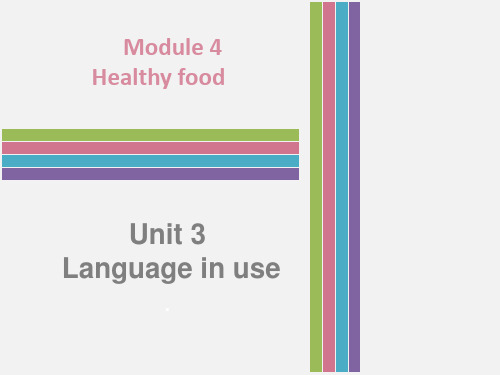
got 有…… / has got + fruit. 汤姆有很多水
其他
果。
there be 某地 There is / There is lots of fruit 有…… are +某人 / in the bag. 袋子里 物+某地 有很多水果。
语法探究
【语法专练1】 (一)根据中文提示完成句子,词数不限。 1. _I_h_a_v_e_g__o_t ___ a football. 我有一个足球。 2. T__h_e_y_h_a_v_e__g_o_t many friends. 他们有很多朋友。 3. _H_e__h_a_s_g_o_t___ some food. 他有一些食物。
brush—brushes
(3)以“辅音字母+y”结尾,变y 为i
es,读
/z / 。如:
baby—babies city—cities country—
countries
语法探究
但以y结尾的专有名词,或“元音字母+y”结尾的 名词变复数时,直接加-s变复数。如: monkey—monkeys holiday—holidays (4)以o结尾的名词,变复数时: ①表示无生命个体加-s。如:photo—photos piano—pianos radio—radios zoo—zoos
men women,如:an Englishman,two Englishmen。但German不 是合成词,故复数形式为Germans。
语法探究
(2)单复数同形,如:deer,sheep,fish, Chinese,Japanese,yuan等。 (3)表示由两部分构成的东西,如glasses (眼镜) ,trousers,clothes等,若表达具体数目,要 借助数量词 pair(对,双),suit(套)等。如:a pair of glasses(一副眼镜),two pairs of trousers(两条长裤)。
2019年外研版七年级英语上册课件:Module 4 Unit 2 Is your food and drink healthy(共56张PPT)
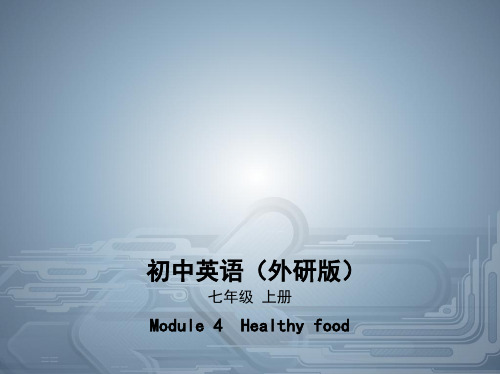
Unit 2 Is your food and drink healthy?
1.remember to do sth.,remember doing sth.
remember to do sth. remember doing sth.
记得应该做但还没有做的事情 记得曾经做过的事情
如:Remember to call me when you get there.你到那里的时候记得给 我打个电话。
A.No,she hasn't B.Yes,she has
C.No,she doesn't D.Yes,she does
解析 由Has she got...?的结构可先排除C和D;问句问的是“她有姐姐 吗”,结合答语中的“她有一个姐姐”可知,要用肯定答语,故答案 为B。 答案 B
Unit 2 Is your food and drink healthy?
加-s 加-es
去掉y,加-ies 加-es或-s (多数)将f或fe 变成ves
shops,desks,bags buses,boxes, watches,brushes babies,cities,stories tomatoes,heroes,pianos life→lives,knife→knives
Unit 2 Is your food and drink healthy?
(二)可数名词和不可数名词 名词有可数名词和不可数名词之分。可数名词就是可以用数目来计算 的名词。不可数名词就是无法以数目来计算的名词。 1.可数名词的复数变化 (1) 规则变化
一般情况下 以s,x,ch,sh结尾
以辅音字母+y结尾 以o结尾 以f或fe结尾
Unit 2 Is your food and drink healthy?
七年级英语上册外研版课件:Module 4 Healthy food Unit2
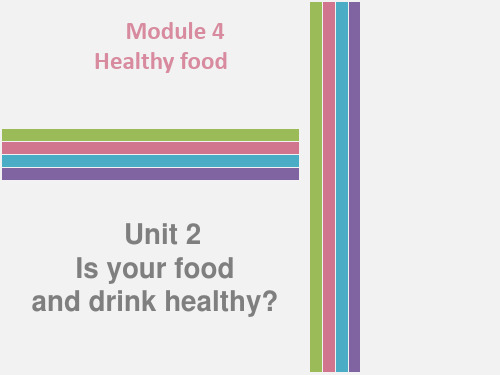
课前预习
一、必背单词
1. 健康的__h_e_a_l_t_h_y____ 2. 美味的__d_e__li_c_io__u_s__ 3. 对……有帮助的_b_e__g_o_o_d__f_o_r_ 形容词 4. 甜的___s_w__e_e_t____ 5. 对……有害的_b__e_b_a__d_f_o_r__ 6. 正确的;对的___r_i_g_h_t_____
目录 contents
课堂导学
课堂导学
1. A bit tired?有点儿累吗? ◆a bit意为“有点儿,稍微”,用来修饰形容词、 副词和动词; 与a little,a little bit,kind of同义。如: The shoes are a bit old. 这双鞋有点旧了。 He is a bit angry. 他有点儿生气了。
课堂导学
3. Eat noodles or rice,not hamburgers. 吃面 条或米饭,不要吃汉堡包。 ◆or用于否定句,意为“和”;用于疑问句中, 意为“还是,或者”。 如: (9)I don’t have a house __o_r__ a car. 我既没有房,也没有车。
课堂导学
课前预习
7. 发胖 get fat 8. 吃合适的食物 eat the right food 9. 吃一份好的早餐 have a good breakfast 10. 每天早上 every morning
课前预习
三、经典句型(请在课文中画出下列句型)
1. 可乐和糖果很甜,Cola and candy are very
吃太多的糖对你没 sweet, and too much sugar
有好处。
is bad for you.
外研版七年级英语上册课件 Module4 Unit1

Module 4 Healthy food Unit1 we’ve got lots of apples
Let’s look and say! We have got some fruit. = We’ve got some fruit.
an orange
oranges /z/
an apple /'æpl/
Make a shopping list
Things Tony’s family has got at home
Food
Drink
×
chocolate Things Tony’s
apples family hasn’t
meat
got at home
chicken oranges
orange juice coffee
OK. Have we got any ____?
Yes, we have. ____ ______ chocolate isn't ____ for you. Let's get some _____.
What kind of fruit? ____?
No, we've got __ __ apples. We haven't got any _____, so let's get ________.
apples /z/
We have got some vegetables. = We’ve got some vegetables.
a carrot
['kærət]
a tomato a potato
[tə'mɑ:təu] [pə'teitəu]
beans
Let’s look and say! We have got some fruit. = We’ve got some fruit.
an orange
oranges /z/
an apple /'æpl/
Make a shopping list
Things Tony’s family has got at home
Food
Drink
×
chocolate Things Tony’s
apples family hasn’t
meat
got at home
chicken oranges
orange juice coffee
OK. Have we got any ____?
Yes, we have. ____ ______ chocolate isn't ____ for you. Let's get some _____.
What kind of fruit? ____?
No, we've got __ __ apples. We haven't got any _____, so let's get ________.
apples /z/
We have got some vegetables. = We’ve got some vegetables.
a carrot
['kærət]
a tomato a potato
[tə'mɑ:təu] [pə'teitəu]
beans
新外研版七年级上册Module4 unit3课件(共16张PPT)
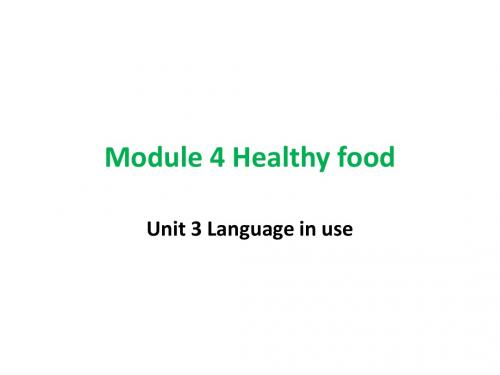
have got a pen and two pencils. 1. I _______ but Ihaven’t _________ got any rulers. has 2. She ______ got some apples and beans, hasn’t got any beef or milk. but she _______
/ No, we haven’t.
We have got some ________, but we haven’t got any ________.
Fill in the blanks with “some” and “any”
any vegetables? A: Have we got _______ 疑问句
apple fish hamburger orange potato orange tomato apple hamburger meat rice apples water hamburgers oranges potatoes tomatoes potato chicken tomato juice milk fish meat rice milk juice chicken water
some chicken? 征询意见 B: How about ________ any chicken. We haven’t got _______ A: OK. When do we use “some” and “any?”
Pattern
Classify Talk about thethe following things they words have got.
注: have 用于主语是第一人称(I, We),第二人称(you)以及第 三人称复数(they),其他复数名词或并列的主语。has 用于第
/ No, we haven’t.
We have got some ________, but we haven’t got any ________.
Fill in the blanks with “some” and “any”
any vegetables? A: Have we got _______ 疑问句
apple fish hamburger orange potato orange tomato apple hamburger meat rice apples water hamburgers oranges potatoes tomatoes potato chicken tomato juice milk fish meat rice milk juice chicken water
some chicken? 征询意见 B: How about ________ any chicken. We haven’t got _______ A: OK. When do we use “some” and “any?”
Pattern
Classify Talk about thethe following things they words have got.
注: have 用于主语是第一人称(I, We),第二人称(you)以及第 三人称复数(they),其他复数名词或并列的主语。has 用于第
Module 4 Unit 3 《Language in use》课件3(26页)(外
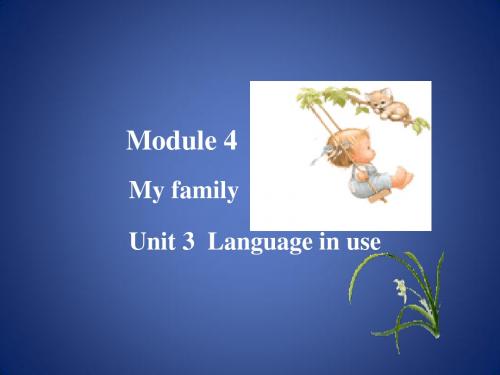
Has Wang Miande got a big family ? Yes , he has . Has he got any children ? Yes , he has . He has three children Has he got any daughters ?
Yes , he has . He’s got two daughters . Has he got any sons ? Yes , he has . He’s got a son .
Has he got any brothers ? No , he hasn’t .
Has he got any sisters ? Yes , he has . He’s got a sister .
mother
I’m Lingling . There are five people
in my family — my parents , my
John’s family ? There are six people in his family . Has he got any grandparents ? Yes , he has . Has he got a big family ? Yes , he has . Has he got a sister ? Yes , he has .
B. The boy is Taotao . 1.__H_a_s__h_e_g_o_t_ a big family ? 2.__H__a_s_h_e_g_o_t_ any brothers ? 3. _H__a_s_h_e_g_o_t__any sisters ?
Write answers to the questions in Activity 1 . A.
- 1、下载文档前请自行甄别文档内容的完整性,平台不提供额外的编辑、内容补充、找答案等附加服务。
- 2、"仅部分预览"的文档,不可在线预览部分如存在完整性等问题,可反馈申请退款(可完整预览的文档不适用该条件!)。
- 3、如文档侵犯您的权益,请联系客服反馈,我们会尽快为您处理(人工客服工作时间:9:00-18:30)。
外研版七年级英语上册课件 Module 5 Unit 3(共29张PPT)
外研版七年级英语上册课件 Module 5 Unit 3(共29张PPT)
4.一般现在时的动词常与 often, usually, always, sometimes, every day, once a week, never, on Sundays等频度副 词和具体的时间状语连用。
外研版七年级英语上册课件 Module 5 Unit 3(共29张PPT)
外研版七年级英语上册课件 Module 5 Unit 3(共29张PPT)
1 Talk about your activities in a week.
I don’t go to school on Sunday. I go to the park on Sunday. I _______________________________________. I _______________________________________.
breakfast, do exercise, go swimming.
外研版七年级英语上册课件 Module 5 Unit 3(共29张PPT)
外研版七年级英语上册课件 Module 5 Unit 3(共29张PPT)
A1 have2 do3 go外研版七年级英语上册课件 Module 5 Unit 3(共29张PPT)
外研版七年级英语上册课件 Module 5 Unit 3(共29张PPT)
外研版七年级英语上册课件 Module 5 Unit 3(共29张PPT)
2 Match the words in Column A with the words and expressions in Column B.
Learning to learn We often use have, do and go in English. Make notes of all the expressions you hear or see: have
外研版七年级英语上册课件 Module 5 Unit 3(共29张PPT)
外研版七年级英语上册课件 Module 5 Unit 3(共29张PPT)
•
我每天六点起床。
I get up at six every day. • 我经常九点钟上床睡觉。
I often go to bed at nine o’clock. • 我有时在周六和我的弟弟一起踢足球。
I sometimes play football with my brother
外研版七年级英语上册课件 Module 5 Unit 3(共29张PPT)
on Saturday.
外研版七年级英语上册课件 Module 5 Unit 3(共29张PPT)
[注意] do 除用作助动词之外,还可用作行为 动词,意为“做”。将含有 do one’s homework,do housework 等短语的肯定句 变为否定句时,不能在原句谓语动词后直接 加 not,而是应在 do 前加 don’t。
The earth moves around the sun.
2.一般现在时的肯定句、否定句和一般疑问句 的构成。(主语为 I, we, you, they 或名词复数): ①肯定式:主语+动词原形+其他.
• 我们/我/你(们)/他们七点半去上学。 We/I/You/They go to school at 7:30.
外研版七年级英语上册课件 Module 5 Unit 3(共29张PPT)
3.一般现在时的特殊疑问句,由 “特殊疑问词+ do +主语+动词原形+其他?” 构成。 • 你什么时候起床?
When do you get up? • 你什么时间去上学?
What time do you go to school?
外研版七年级英语上册课件 Module 5 Unit 3(共29张PPT)
外研版七年级英语上册课件 Module 5 Unit 3(共29张PPT)
• 我晚上做我的家庭作业。 I do homework in the evening.
• 我不在晚上做我的家庭作业。 I don’t do my homework in the evening.
B a) dinner b) your homework c) to school d) a break e) an English lesson f) to bed g) home
外研版七年级英语上册课件 Module 5 Unit 3(共29张PPT)
②否定式:主语+ don’t +动词原形+其他. ③一般疑问句: Do +主语+动词原形+其他?
肯定回答: Yes, 主语+ do. 否定回答: No, 主语+ don’t.
外研版七年级英语上册课件 Module 5 Unit 3(共29张PPT)
外研版七年级英语上册课件 Module 5 Unit 3(共29张PPT)
——你喜欢历史吗? ——是的,我喜欢。/不,我不喜欢。 —Do you like history? —Yes, I do. / No, I don’t.
外研版七年级英语上册课件 Module 5 Unit 3(共29张PPT)
一般现在时态(一) 1.用法:
(1)表示经常或习惯性的动作。 • 我们在学校吃午饭。
We have lunch at school.
(2)表示主语具备的性格或能力、爱好等。 • 他们喜欢(吃)面条。 They like noodles. • 我们说汉语。 We speak Chinese. (3)表示普遍真理或客观事实。 • 地球围绕着太阳转。
Module 5 My school day
Unit 3 language in use
外研·七年级上册
Language practice
We have Chinese at eight o’clock. We don’t have maths. Do you like maths? Yes, I do. In the evening, I watch TV and have dinner with my family.
外研版七年级英语上册课件 Module 5 Unit 3(共29张PPT)
4.一般现在时的动词常与 often, usually, always, sometimes, every day, once a week, never, on Sundays等频度副 词和具体的时间状语连用。
外研版七年级英语上册课件 Module 5 Unit 3(共29张PPT)
外研版七年级英语上册课件 Module 5 Unit 3(共29张PPT)
1 Talk about your activities in a week.
I don’t go to school on Sunday. I go to the park on Sunday. I _______________________________________. I _______________________________________.
breakfast, do exercise, go swimming.
外研版七年级英语上册课件 Module 5 Unit 3(共29张PPT)
外研版七年级英语上册课件 Module 5 Unit 3(共29张PPT)
A1 have2 do3 go外研版七年级英语上册课件 Module 5 Unit 3(共29张PPT)
外研版七年级英语上册课件 Module 5 Unit 3(共29张PPT)
外研版七年级英语上册课件 Module 5 Unit 3(共29张PPT)
2 Match the words in Column A with the words and expressions in Column B.
Learning to learn We often use have, do and go in English. Make notes of all the expressions you hear or see: have
外研版七年级英语上册课件 Module 5 Unit 3(共29张PPT)
外研版七年级英语上册课件 Module 5 Unit 3(共29张PPT)
•
我每天六点起床。
I get up at six every day. • 我经常九点钟上床睡觉。
I often go to bed at nine o’clock. • 我有时在周六和我的弟弟一起踢足球。
I sometimes play football with my brother
外研版七年级英语上册课件 Module 5 Unit 3(共29张PPT)
on Saturday.
外研版七年级英语上册课件 Module 5 Unit 3(共29张PPT)
[注意] do 除用作助动词之外,还可用作行为 动词,意为“做”。将含有 do one’s homework,do housework 等短语的肯定句 变为否定句时,不能在原句谓语动词后直接 加 not,而是应在 do 前加 don’t。
The earth moves around the sun.
2.一般现在时的肯定句、否定句和一般疑问句 的构成。(主语为 I, we, you, they 或名词复数): ①肯定式:主语+动词原形+其他.
• 我们/我/你(们)/他们七点半去上学。 We/I/You/They go to school at 7:30.
外研版七年级英语上册课件 Module 5 Unit 3(共29张PPT)
3.一般现在时的特殊疑问句,由 “特殊疑问词+ do +主语+动词原形+其他?” 构成。 • 你什么时候起床?
When do you get up? • 你什么时间去上学?
What time do you go to school?
外研版七年级英语上册课件 Module 5 Unit 3(共29张PPT)
外研版七年级英语上册课件 Module 5 Unit 3(共29张PPT)
• 我晚上做我的家庭作业。 I do homework in the evening.
• 我不在晚上做我的家庭作业。 I don’t do my homework in the evening.
B a) dinner b) your homework c) to school d) a break e) an English lesson f) to bed g) home
外研版七年级英语上册课件 Module 5 Unit 3(共29张PPT)
②否定式:主语+ don’t +动词原形+其他. ③一般疑问句: Do +主语+动词原形+其他?
肯定回答: Yes, 主语+ do. 否定回答: No, 主语+ don’t.
外研版七年级英语上册课件 Module 5 Unit 3(共29张PPT)
外研版七年级英语上册课件 Module 5 Unit 3(共29张PPT)
——你喜欢历史吗? ——是的,我喜欢。/不,我不喜欢。 —Do you like history? —Yes, I do. / No, I don’t.
外研版七年级英语上册课件 Module 5 Unit 3(共29张PPT)
一般现在时态(一) 1.用法:
(1)表示经常或习惯性的动作。 • 我们在学校吃午饭。
We have lunch at school.
(2)表示主语具备的性格或能力、爱好等。 • 他们喜欢(吃)面条。 They like noodles. • 我们说汉语。 We speak Chinese. (3)表示普遍真理或客观事实。 • 地球围绕着太阳转。
Module 5 My school day
Unit 3 language in use
外研·七年级上册
Language practice
We have Chinese at eight o’clock. We don’t have maths. Do you like maths? Yes, I do. In the evening, I watch TV and have dinner with my family.
